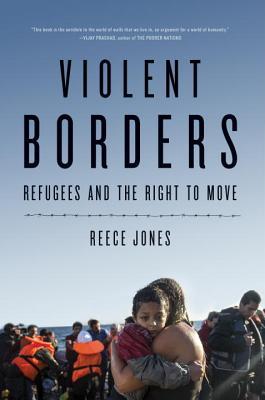What do you think?
Rate this book


A major new exploration of the refugee crisis, focusing on how borders are formed and policed
Forty thousand people have died trying to cross between countries in the past decade, and yet international borders only continue to harden. The United Kingdom has voted to leave the European Union; the United States elected a president who campaigned on building a wall; while elsewhere, the popularity of right-wing antimigrant nationalist political parties is surging.
Reece Jones argues that the West has helped bring about the deaths of countless migrants, as states attempt to contain populations and limit access to resources and opportunities. “We may live in an era of globalization,” he writes, “but much of the world is increasingly focused on limiting the free movement of people.”
In Violent Borders, Jones crosses the migrant trails of the world, documenting the billions of dollars spent on border security projects and the dire consequences for countless millions. While the poor are restricted by the lottery of birth to slum dwellings in the ailing decolonized world, the wealthy travel without constraint, exploiting pools of cheap labor and lax environmental regulations. With the growth of borders and resource enclosures, the deaths of migrants in search of a better life are intimately connected to climate change, environmental degradation, and the growth of global wealth inequality.
Newly updated with a discussion of Brexit and the Trump administration.
212 pages, Paperback
First published January 1, 2016
Restrictions on movement at borders are part of a long term conflict between states and people who move, a conflict that goes back to the earliest states and human settlements. While the regulation of movement takes different forms through various historical periods, the underlying desire to protect privileges accrued through the control of resources and opportunities remains the same.The European Union which my country is, according to the current government, so eager to get out of, is a place so many others are eager to enter, often fleeing conflict or poverty caused by EU countries or their colonial/imperialist activities or legacies. But the exploiter countries have shut their doors. Thousands die trying to enter the EU and other wealthy areas every year. 39 would-be migrants were found dead in a truck here in the UK while I was reading this book. First, the media reported that they were Chinese. Later, as individual stories started to surface linking Vietnamese families to the tragedy, the press referred to them as Vietnamese. I was sickened by the correction, wondering on what flimsy basis the original assumption had been made. Just as Jones writes, the media blamed smugglers and "people traffickers" for the deaths, never once appearing to wonder whether the border and its strict demands for passports, visas, papers please, or the "hostile environment" (or even the kind of racism implicit in a media too lazy to distinguish Vietnamese from other East Asian nationalities) might have some hand in creating dangerous conditions for those urgently seeking a better life elsewhere.
"These responses to migration draw on fantasies of national purity and a fear of change that is exploited by politicians. The exclusion of others from resources and opportunity is based on the idea that the in-group should be protected no matter what, with little regard for what effect it might have on the other and without questioning why there is a distinction between “us” and “them” in the first place. Rather than hard lines around nations of people and their homelands, political borders are systems for controlling land and resources and limiting the movement of people. The “nations” they enclose are not long-term historical realities, but new political communities that developed with the emergence of states and borders. In Foucault’s terms, maps of bordered territorial states are regimes of truth that establish what is true and legitimate in society. They justify some claims to land and history, while marking others as false and not worthy of consideration. These regimes are not fundamental truths that are universal; they are set of agreements within a particular society that establish a set of rules to decide what is true, but it does not have to be that way."